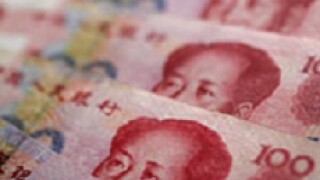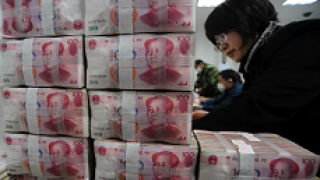SDR
-
Asset manager AllianceBernstein is offering a drastically different view on the knock on effects from the renminbi’s inclusion in the IMF’s Special Drawing Rights (SDR) basket. While the consensus is that it will have little impact on the desirability of RMB assets, the manager is forecasting a huge spike in demand.
-
Markets have been readying for the renminbi’s inclusion in the SDR basket for months, but now that we have the detail what do the experts think? GlobalRMB wraps up the most noteworthy of the market reaction, on- and offshore.
-
The renminbi may have got the go head to join the list of currencies backing IMF’s Special Drawing Rights basket, but the change will not actually go live until October 16. Although the IMF has said the delay is merely due to operational reason, questions are being asked about whether other factors are at play.
-
In a widely anticipated move, the IMF executive board has approved the renminbi as the fifth currency in the Special Drawing Rights (SDR) basket of currencies with a weighting of 10.92%, the IMF said in a November 30 statement. The new SDR will go into effect as of October 1, 2016.
-
Offshore renminbi funding costs have increased 100bp-150bp in recent weeks after China’s central bank shut down cross-border lending. The move was designed to reduce volatility in offshore renminbi (CNH) ahead of the IMF decision on its Special Drawing Rights basket, several offshore traders have said to GlobalRMB.
-
While it’s a now presumed the renminbi will make it into the IMF’s Special Drawing Rights (SDR) basket, one thing still up for debate is the size of inflows into the currency. GlobalRMB rounds up some of the predictions in the market.
-
Chinese authorities are expected to allow the renminbi to depreciate following the decision on the IMF Special Drawing Rights (SDR) basket, though there is a debate about how severe that fall will be. Either way, it is likely a hike in rates by the Federal Reserves (Fed) could hold more sway on the RMB's future than SDR inclusion.
-
The People’s Bank of China (PBoC) admitted a first batch of seven foreign central banks, sovereign wealth funds (SWF) and supranational agencies to the onshore interbank foreign exchange (FX) market, according to a November 25 announcement.
-
China's Ministry of Finance (MoF) is set to auction the second batch of CNH government bonds this year in Hong Kong on November 23. Although it seems the renminbi has secured its inclusion in the IMF’s Special Drawing Rights (SDR) basket, market participants doubt this will give an immediate boost to the CNH market.
-
The RMB passed through another goalpost on its path to inclusion in the International Monetary Fund’s Special Drawing Rights (SDR) facility on Friday, with the IMF staff saying that the currency meets all the criteria to join the basket. The fund's executive board will make the final call on the issue when it meets on November 30.
-
The Standard Chartered Renminbi Globalisation Index (RGI) rose 3.26% month on month in September due to the jump in FX turnover for a second consecutive month. However, the bank expects the RGI to fall in Q4 as RMB depreciation expectations are likely to persist in the market.
-
China’s decision to reform its parity mechanism has ushered in a new phase of volatility for both the onshore RMB (CNY) and its offshore counterpart (CNH). Beijing has said markets should welcome the volatility as a signal of its reduced influence on the currency. For market watchers, external forces will be equally crucial to its success.











